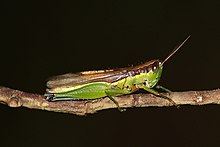
Jojoba – also commonly called goat nut, deer nut, pignut, wild hazel, quinine nut, coffeeberry, and gray box bush – is native to the Southwestern United States. Simmondsia chinensis is the sole species of the family Simmondsiaceae, placed in the order Caryophyllales.
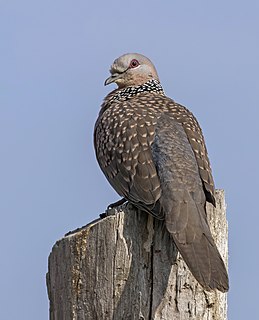
The spotted dove is a small and somewhat long-tailed pigeon that is a common resident breeding bird across its native range on the Indian subcontinent and in Southeast Asia. The species has been introduced to many parts of the world and feral populations have become established.
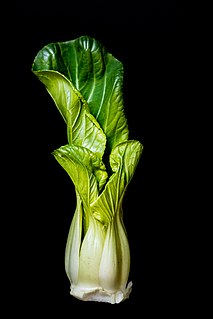
Bok choy, pak choi or pok choi is a type of Chinese cabbage. Chinensis varieties do not form heads and have green leaf blades with lighter bulbous bottoms instead, forming a cluster reminiscent of mustard greens. It has a flavor between spinach and water chestnuts but slightly sweeter with a mildly peppery undertone. The green leaves have a stronger flavor than the white bulb.
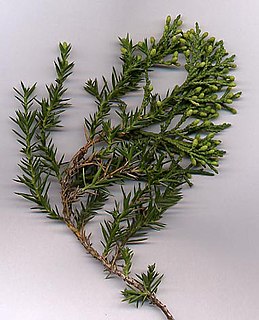
Juniperus chinensis, the Chinese juniper is a species of plant in the cypress family Cupressaceae, native to China, Myanmar, Japan, Korea and the Russian Far East. Growing 1–20 m (3.3–65.6 ft) tall, it is a very variable coniferous evergreen tree or shrub,

Astilbe is a genus of 18 species of rhizomatous flowering plants within the family Saxifragaceae, native to mountain ravines and woodlands in Asia and North America. Some species are known by the common names false goat's beard and false spirea.

Schisandra chinensis, whose fruit is called magnolia berry or five-flavor-fruit, is a vine plant native to forests of Northern China and the Russian Far East and Korea. Wild varieties of Schisandra chinensis are also found in Japan. It is hardy in USDA Zone 4. The fruits are red berries in dense clusters around 10 centimetres (3.9 in) long.
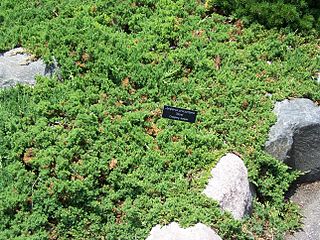
Juniperus procumbens is a species of shrub in the cypress family Cupressaceae, native to Japan. This low-growing evergreen conifer is closely related to the Chinese juniper, Juniperus chinensis, and is sometimes treated as a variety of it, as J. chinensis var. procumbens.

Rosa chinensis, known commonly as the China rose, Chinese rose, or Bengal rose, is a member of the genus Rosa native to Southwest China in Guizhou, Hubei, and Sichuan Provinces. The first publication of Rosa chinensis was in 1768 by Nikolaus Joseph von Jacquin in Observationum Botanicarum, 3, p. 7, p. 55.

Neolamarckia cadamba, with English common names burflower-tree, laran, and Leichhardt pine, and called kadam or cadamba locally, is an evergreen, tropical tree native to South and Southeast Asia. The genus name honours French naturalist Jean-Baptiste Lamarck. It has scented orange flowers in dense globe-shaped clusters. The flowers are used in perfumes. The tree is grown as an ornamental plant and for timber and paper-making. Kadam features in Indian religions and mythologies.
The Chinese salamander is a species of salamander in the family Hynobiidae endemic to China. Its natural habitats are subtropical or tropical moist lowland forests, rivers, freshwater marshes, freshwater springs, and arable land. It is threatened by habitat loss.

Astilbe chinensis, commonly known as false goat's beard, tall false-buck's-beard or Chinese astilbe, is a plant in the saxifrage family, Saxifragaceae. It is commonly grown in shade gardens.
Hierodula chinensis is a species of praying mantis in the family Mantidae.

Brachyponera chinensis, or the Asian needle ant, is a ponerine ant native to areas of Japan and Asia. The species can also be found in the United States, where it is an adventive and possibly invasive species. It is documented from Georgia, Kentucky, North Carolina, South Carolina, and Virginia, though unpublished records place it in Alabama and Tennessee. Sightings have been confirmed as far north as Maryland. The pest species is of growing concern due to ecological impacts on biodiversity and medical risks to human health, via sting-induced anaphylaxis. It prefers nesting in dark, damp areas in soil beneath stones, logs, stumps, and debris.
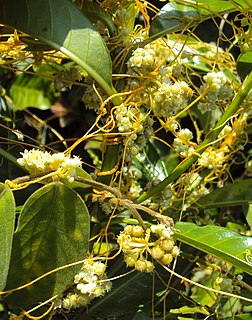
Cuscuta chinensis Lam. is a stem holoparasite vine in the family Convolvulaceae. It was first described in China in 1786.

Acrida cinerea, sometimes called the Oriental longheaded grasshopper/locust or the Chinese grasshopper though this name is also applied to Oxya chinensis, is a member of the Acrididae family. Like other members of the genus Acrida, Acrida cinerea lacks stridulatory organs on its legs and so they do not make noise while moving.

Oxyinae is subfamily of grasshoppers in the family Acrididae. Species are distributed throughout Africa and Australasia.

Oxya is a genus of grasshoppers found in Africa and Asia.
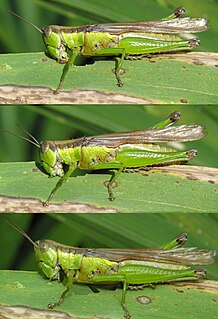
Oxya japonica, the Japanese grasshopper, is a species of short-horned grasshopper in the family Acrididae. It is found in Indomalaya and eastern Asia.
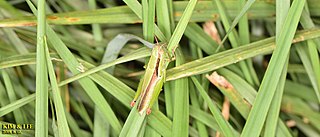
Oxya sinuosa is a species of short-horned grasshopper in the family Acrididae. It is found in eastern Asia.

Oxya hyla is a species of grasshopper of the Acrididae family described by Serville in 1831.
